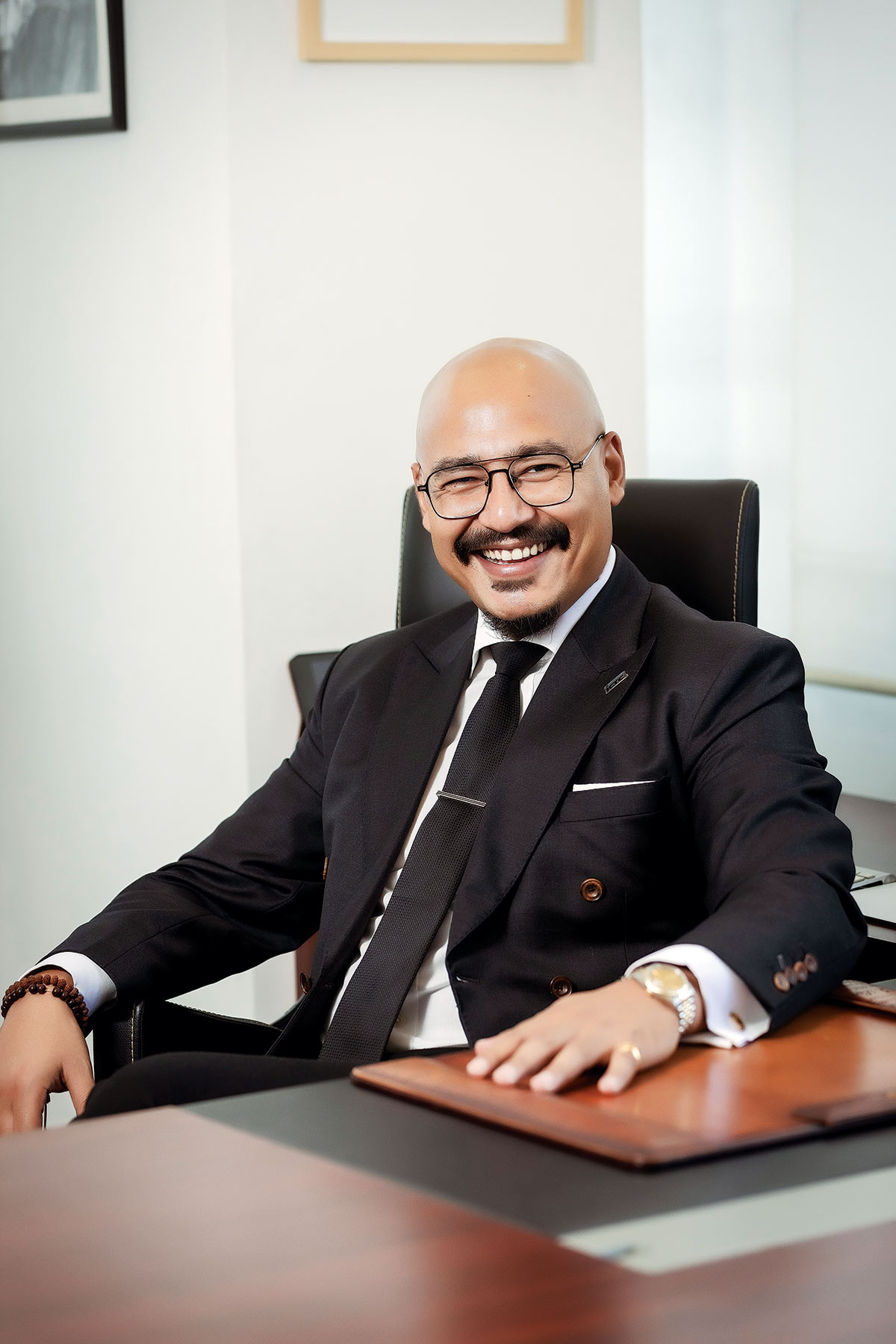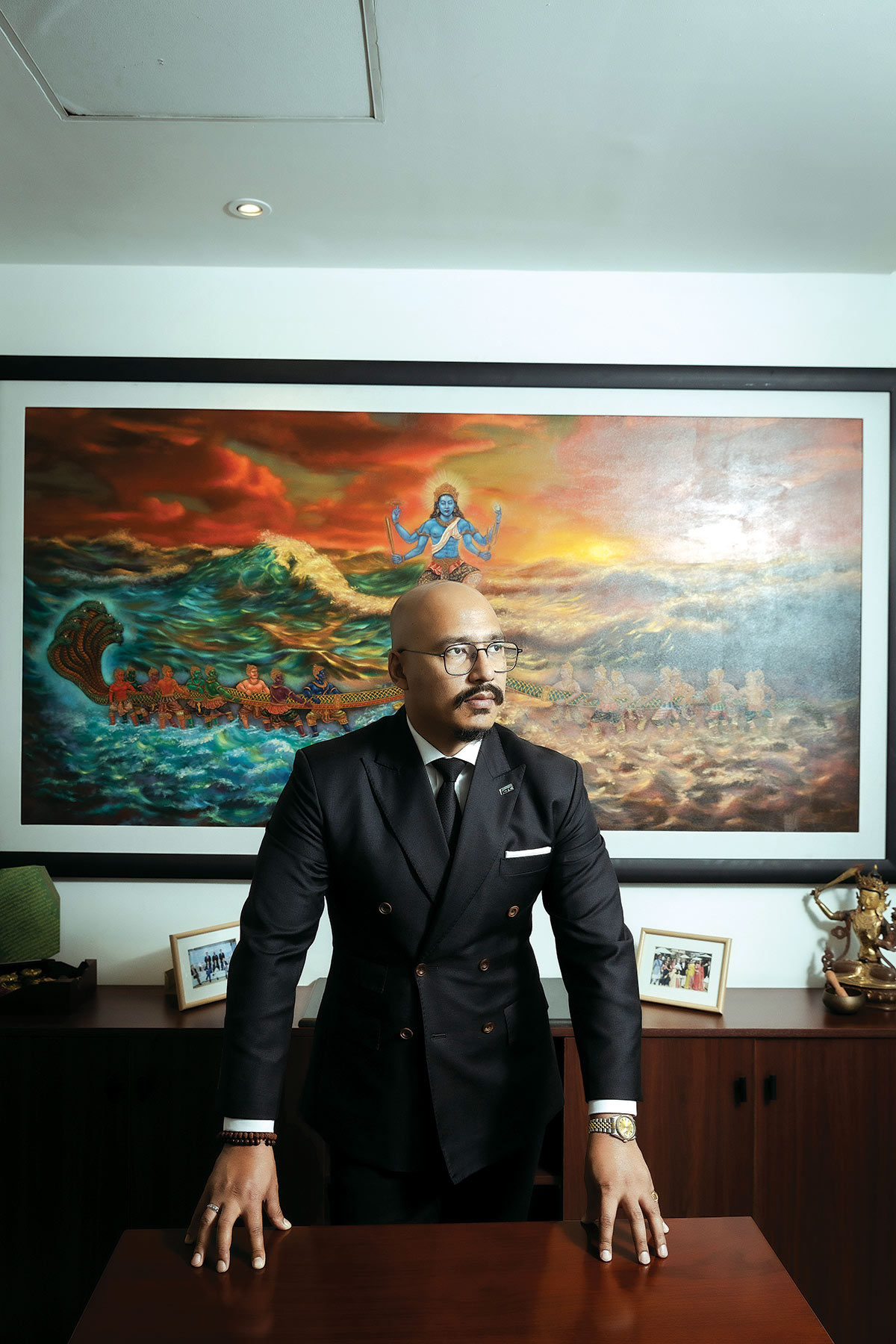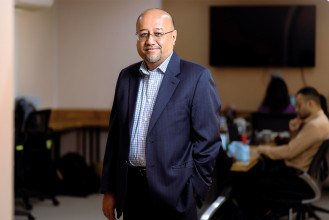
ICTC Group, one of Nepal’s leading business conglomerates, had humble beginnings as a small stationery mart in the back streets of Kathmandu in the early 70s. This modest start laid the groundwork for the establishment of the Inter Continental Trading Concern in 1975, whose initials were retained when ICTC Pvt Ltd was formed. Over the decades, ICTC has evolved into a diverse powerhouse, with interests ranging from hydropower and construction to liquor and hospitality to insurance and information technology.

At the helm of this multifaceted enterprise is Jayadin Shrestha, the Joint Managing Director of ICTC and the third generation of his family. With a fresh, innovative outlook, Shrestha aims to further diversify the group’s verticals, steering ICTC towards new horizons while maintaining its core values and traditions.
In a conversation with Business 360, Shrestha shares insights into the advantages and challenges of continuing a business legacy, the values that guide him, and the strategic changes he has implemented at ICTC. He also offers his perspective on the current economic climate, both locally and globally, and reveals his vision for the future of ICTC.
What are the plus points and challenges taking forward a business legacy?
Taking forward a business legacy offers several advantages. Utilising a robust existing platform eliminates the need to start from scratch, which can save time and resources. From attracting top talent to financials to organisation strengths, there are many professional advantages to having such a legacy. On a personal note, it is a matter of huge pride for us as well as an incredible source of inspiration to be part of such a legacy. The knowledge, values and experience of our wiser and older generation is priceless, no university can teach us what they can teach us and I feel incredibly fortunate to be part of such a legacy.
However, there are also challenges to consider. Balancing the need for innovation and staying competitive with the need to preserve the core values and traditions of the business can be difficult. Though there are a number of challenges in carrying such a legacy forward, I personally feel that one of the most difficult aspects can at times be the weight of expectations. Coming from a family where the older generations have achieved so much despite coming from a non-business family is an immense inspiration but at the same time also extremely intimidating.
Trying to live up to those expectations is uniquely challenging specially with such large shoes to fill nevertheless, I try to take it as an inspiration as I feel that our group ICTC and my older generation is an example of how with hard work and determination, you can achieve great success even if you don’t have the background or resources.

What are the values you adhere to while doing business? What are you guided by and what is your success mantra?
Our values are to draw on the wisdom of older generations while combining it with the energy of our own generation, aiming to create a harmonious blend of tradition and innovation to further escalate business growth and in turn contribute to the overall economic growth of our country. My personal view on the pathway to success are the three Cs that my father Sri Dinesh Lal Shrestha advised me when I initially started 15 years ago which is Commitment, Consistency and Communications. Also, I keep in mind the mantra that my grandfather and our founder Sri Ram Lal Shrestha gave me “b'vdf gcflQg', ;'vdf gdflQg'”. This helps to keep me grounded.
Could you please tell us about the changes that you have initiated in ICTC?
We believe, that it is essential to maintain a professional approach in business. It is also important to be able to adapt to changes by staying informed about industry trends, technological advancements and customer preferences.
As a member of the new generation, we believe it is essential for us to initiate change to foster a culture of continuous learning and development among employees which in turn will enhance their skills and knowledge. We believe our employees are our most valuable assets in all of our companies.
How do you view the current economic scenario, particularly in the business you are engaged in?
We are hopeful that with improvements in relevant laws, a more stable investment climate, consistent policies and a positive working environment, we will see improvements in our business and the overall business environment in the country. We remain optimistic about the future and are committed to finding innovative solutions to drive growth and success in this ever-changing landscape.
What are some of the changes in business trends globally that could be applicable in Nepal?
Adapting all global trends to Nepal’s unique context is presently slightly difficult but it is definitely essential for sustainable growth in the future.
Collaborating with international organisations and businesses to bring in expertise (knowledge transfer), technology, and investment to support Nepal’s economic development would be helpful. Investing in the education and skill development of our workforce that can eventually compete in the global market is important for the overall development of our businesses as well as development of the country as a whole.
What excites you about doing business in current times?

There are many challenges and uncertainties in Nepal’s path to leveraging the immense opportunities that are present in the country. We are as a country growing and with growth comes hurdles and obstacles but we believe with these obstacles there are immense opportunities as well.
I strongly believe that we can be the generation that helps build this country standing on the platform that the older generation has given, be it in business or politics. A lot needs to be done and therefore a lot can be done. We are hopeful and believe in our country. This excites me.
How do you view the current economic climate in relation to government policies?
The policies and legal frameworks have evolved significantly over time, as highlighted by major business organisations through various chambers of commerce. However, there is a need to stimulate the economy and attract foreign investments. It might be helpful to bring well thought out, researched and consistent policies for a positive and business/investment friendly environment, however, I believe making policies is a relatively easy part, implementing them is the challenge and we need to focus on that.
A quote from Theodore Roosevelt is always in my mind when I navigate my days. “It is not the critic who counts: not the man who points out how the strong man stumbles or where the doer of deeds could have done better. The credit belongs to the man who is actually in the arena, whose face is marred by dust and sweat and blood, who strives valiantly, who errs and comes up short again and again, because there is no effort without error or shortcoming, but who knows the great enthusiasms, the great devotions, who spends himself in a worthy cause; who, at the best, knows, in the end, the triumph of high achievement, and who, at the worst, if he fails, at least he fails while daring greatly, so that his place shall never be with those cold and timid souls who knew neither victory nor defeat.”
I trust our various business chambers and umbrella organisations who are advising relevant government institutions on such policies and their implementation.
Can you provide an overview of ICTC’s involvement in various industries in Nepal, including the company’s main projects or partnerships in these sectors?
ICTC Group, established 49 years ago, is a leading business conglomerate in Nepal with activities focused on various core business sectors.
ICTC Pvt Ltd, the representation arm of the group specialises in providing value-added local liaison representation services. We offer local logistics and advisory services to foreign principals seeking to secure and execute various infrastructure development projects in Nepal.
We are also the major promoters of the Upper Solu Hydroelectric Company (USHEC), which is a publicly listed hydropower company. Our plant is located in Solukhumbu district and is currently in operation, generating 23.5 megawatts of power.
ICTC Group is also one of the promoters of one of the largest private sector investments in tourism sector in Nepal – Taragaon Regency Hotels (Hyatt Regency). Hyatt Regency Kathmandu is a five-star super deluxe city resort hotel built on a 40-acre site in Bouddha.
Insurance is another sector that we have a stake in through Siddhartha Premier Insurance. Initially, the ICTC Group promoted Premier Insurance Co that had been in operation since 1994, and was amongst the top non-life insurance companies in the country. We were one of the first insurance companies in Nepal to be certified with ISO 9001:2000 quality certification. Later, in March 2023, we merged with Siddhartha Insurance to become one of the top second-generation non-life general insurance companies in Nepal, with more than 120 branch offices across the nation.
We are also the promoters of Highland Distillery, which is one of the most successful alcoholic and non-alcoholic beverages producing companies in Nepal with iconic brands such as Virgin, Highlander as well as the most sought-after brands such as Gurkha and Guns, Bandipur and Yeti vodka. In 2011, we further established United Liquors, which is located in Chitwan. This is a large-scale high-grade liquor production unit. Looking at the scope of the liquor industry in Nepal, we acquired Avanish Distillery in 2016. Avanish Distillery is ICTC’s third modern manufacturing, blending and bottling unit. We also have Prime International, which is one of the largest trading and marketing companies involved in trading, marketing and distribution of fast-moving consumer goods.
Recently, in 2021, we established ICTC Infrastructure, which is an infrastructure company that plans to provide local construction and engineering services such as civil works, EM, HM, and substations/transmission lines fabrication, installation and commissioning services in Nepal. Our plans have broad scopes/sectors and our service areas include hydropower and dam construction, housing construction, infrastructure engineering works and project development schemes such as EPC, PPP in partnership with civil, mechanical contractors and investors etc.
Meanwhile, ICTC Real Estate, established in 2007, has the vision of becoming a major real estate developer in Nepal. Group synergy gives ICTC Real Estate a strategic advantage, making it an ideal company to provide real ‘value-added’ services to the real estate sector. Currently we are working on a real estate development project in Nijgadh.
Established in 1976 and acquired by ICTC Group in 2019, CEMAT Consultants provides a complete range of consulting activities, from design and management of projects to construction supervision and project management to Operations and Maintenance (O&M) advisory services. CEMAT is recognised as one of the leading consulting agencies in Nepal with a sound track record of a large number of successfully executed projects. Our services have covered over 65 districts of Nepal and extended to countries like Japan, Bhutan, Kuwait, Timor-Leste (East Timor), and Afghanistan.
In the IT business, we have Infocom Solutions, a system integrator; and Arhant Solutions, a software development company.
How does ICTC support digital transformation and technological advancements in your businesses and what specific initiatives or solutions has the company implemented to drive innovation in these sectors?
The shift towards digitalisation is reshaping the way businesses operate and interact with customers, we are gradually investing in new technologies to streamline processes and improve productivity in our various core sectors.
How does ICTC address the unique challenges and requirements of the hotel, hydropower, and construction sectors in Nepal when it comes to policy adaptation?
ICTC group addresses the unique challenges and requirements of all the business sectors we are involved in by prioritising compliance with all legal and regulatory requirements to ensure that our operations are conducted ethically and responsibly. Our commitment to compliance helps us maintain a positive reputation and build trust with our stakeholders. We strictly adhere to the policies, acts, and rules set by the government for each industry, as well as our group’s internal policies.
With the increasing importance of sustainability and environmental considerations in the industries ICTC operates in, how do you integrate sustainable practices and technologies?
With the increasing importance of sustainability and environmental considerations in the industries ICTC operates in, we try to integrate sustainable practices and technologies into our solutions by keeping track of green technology advancements and promoting the use of renewable energy sources where practical.
Could you provide examples of how ICTC has contributed to sustainable development in Nepal through its projects in these industries?
ICTC has contributed to sustainable development in Nepal through its various companies in various industries/projects by directly and indirectly employing more than 3,000 individuals, thereby supporting over 15,000 families. Our renewable energy is generated through a sustainable hydropower plant. We also try to prioritise inclusive development, with majority of our liquor factory staff being women. Additionally, the group has established the ICTC Ram Rukmani Charitable Trust (named after our grandparents), which offers assistance to various causes in an organised and fair manner.
As the Joint Managing Director, what is your vision for the future of the hotel, hydropower, and construction industries in Nepal?
My vision for the future of the ICTC Group is to consolidate, scale up and expand the present group of industries while continuing to explore other industrial sectors. This will involve strategic planning, market research and investment in new technologies, industries and resources to ensure sustainable growth and profitability. By expanding into new industries, our aim is to tap into new markets, reduce risk by further diversifying our revenue streams, and capitalise on emerging opportunities.
Are there any specific industry partnerships or initiatives that the company has established to foster innovation and industry-wide collaboration?
Our founding company, ICTC Pvt Ltd, has been partnering with multiple international organisations in numerous infrastructure development projects funded by various bilateral and multilateral funding agencies for almost 50 years. Hyatt International manages Taragaon Regency Hotels, offering branding and global management expertise. Our liquor industry was founded in collaboration with Shaw & Wallace India, and we currently partner with Macduff International Scotland for some of our products.
Our insurance company has reinsurance agreements with reputable foreign reinsurers, while our software company collaborates with top software firms. The hydropower plant utilises machinery from renowned foreign manufacturers. While our engineering arm Cemat is currently working as subconsultants with multiple international companies in sectors such as hydropower, transport and water supply.
Could you share any future plans or upcoming projects that ICTC has in the pipeline?
At the moment our plans are limited to exploration and research, we are waiting for the right opportunity, environment and time for further expansions. Our plans include exploring opportunities for further diversification within our existing industries as well as exploring strategic partnerships or collaborations with other local and international businesses in newer industries.
How does ICTC measure the success and impact of its projects?
We as a business/corporate group gauge our success and impact by looking at profits, growth and the overall positive influence on society but at the same time I personally put emphasis on the efforts and its sincerity, success will eventually follow.
A quote from Theodore Roosevelt is always in my mind when I navigate my days. “It is not the critic who counts: not the man who points out how the strong man stumbles or where the doer of deeds could have done better. The credit belongs to the man who is actually in the arena, whose face is marred by dust and sweat and blood, who strives valiantly, who errs and comes up short again and again, because there is no effort without error or shortcoming, but who knows the great enthusiasms, the great devotions, who spends himself in a worthy cause; who, at the best, knows, in the end, the triumph of high achievement, and who, at the worst, if he fails, at least he fails while daring greatly, so that his place shall never be with those cold and timid souls who knew neither victory nor defeat.”



-1767340083.jpg)

